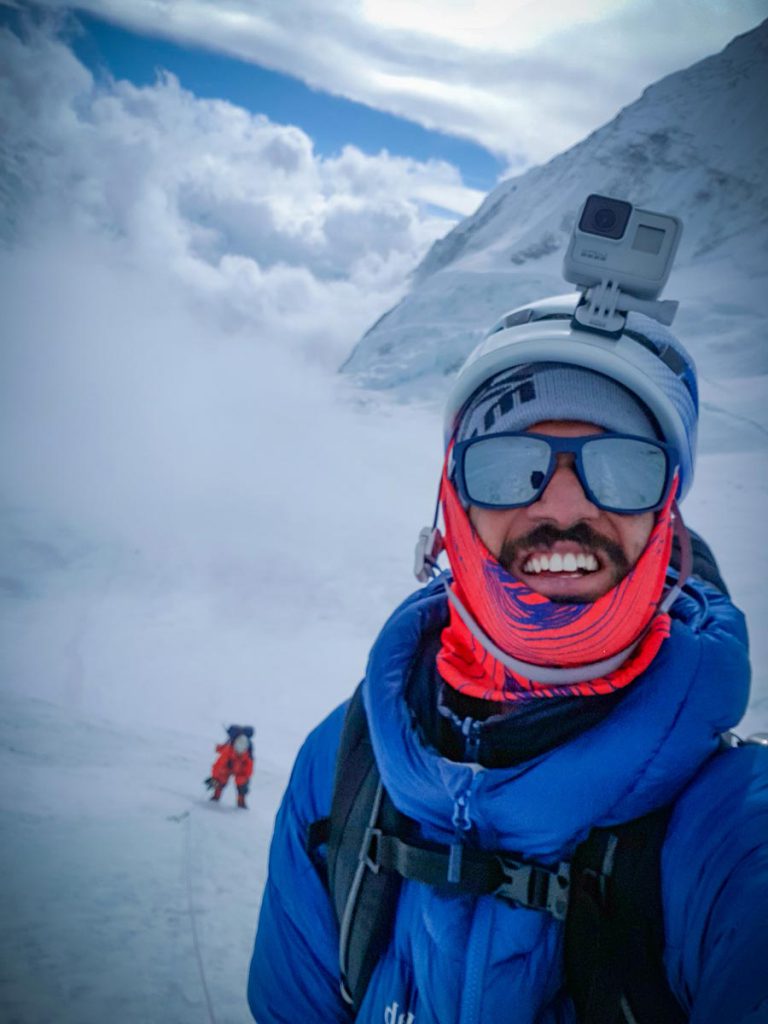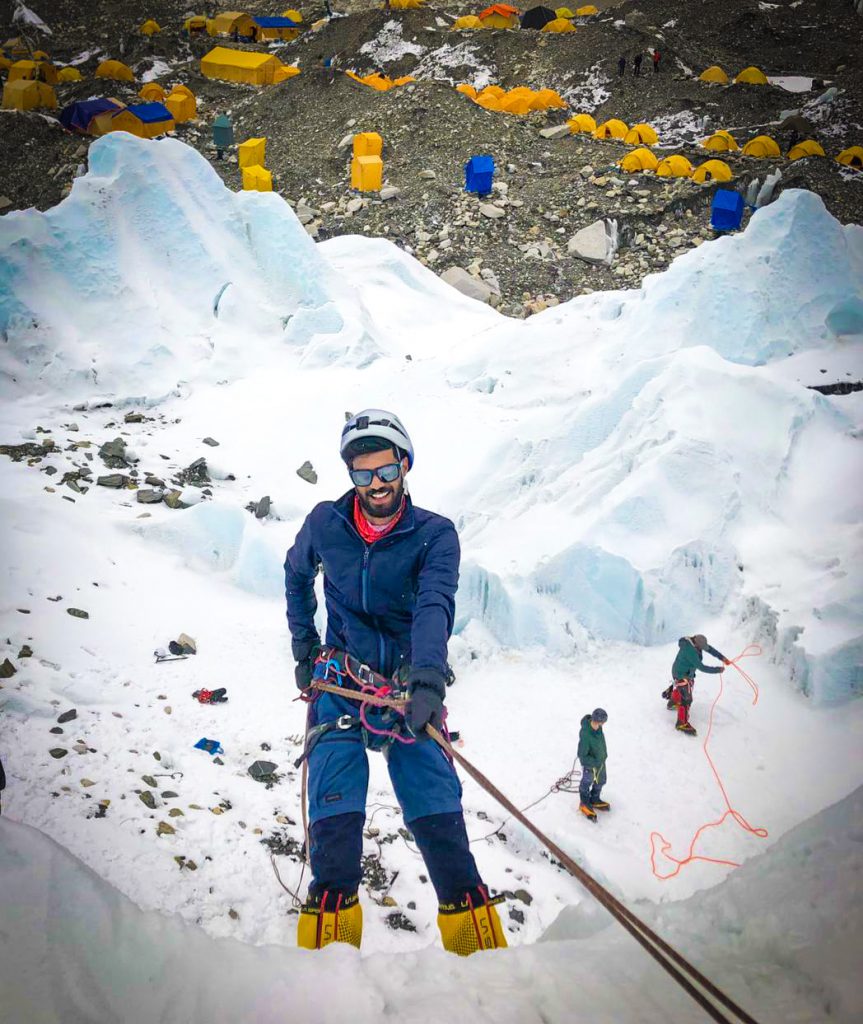Blog, Inspiring Kashmiris
Meet the Youngest Kashmiri to pursue Mount Everest
Tell us about yourself?
My name is Rizza Alee. I am a camerist and a professional mountaineer. I am the youngest Kashmiri who attempted to scale Mount Everest in 2019. I climb mountains throughout the year to pursue the farthest expansion of Earth. I work to capture stories that inspire people to consider their relationship with nature, and also promote the preservation of the environment everywhere.

What inspired you to be a climber and a snowboarder?
I have been inclined towards nature and adventure since childhood. I grew up at a place called Nowlari in district Baramulla which is situated at a high altitude and surrounded by hills. The usual route required trekking and it gave me the interest to explore mountains and pursue adventure. And, overall, as we know Kashmir is surrounded by magnificent mountains on all sides, the peaks of mountains have always fascinated me. I would look at them while growing up and would say to myself ‘maybe someday I will climb them.’
As I grew up, my passion for nature and photography increased. I was a shy schoolboy, so transitioning from that into a sportsman, an adventure sportsman, has not been easy, it has taken mental strength along with equal physical strength to get here.
Besides all this, earlier my passion for mountaineering was not supported by my family, like other career options such as being a doctor, an engineer is looked at as a successful career and a formula for a good life. However, over the years, they have understood my passion for it, are supporting and more interested in my plans than they were before.
You are the youngest Kashmiri to attempt climbing Mount Everest, share your experience?
The Everest Expedition in 2019 changed my life, the way I looked at mountain climbing, how precious life is, and the importance of mental strength along with physical strength.
Before training for Everest, I had successfully climbed the 6153m Stok Kangri peak in Ladakh, Friendship Peak in Himachal Pradesh, Srinagar’s highest peak Mount Mahadev, and in Pirpanjal Range, besides others. It helped me to understand the requirements, and skills that mountaineering demands.
Before the Everest Expedition, I went to Manali for my mountaineering course and in January 2019 I went to Mount Abu Rajasthan for my rock climbing course and completed it. I have also done a specialized course in mountain climbing from Atal Bihari Vajpayee Institute of mountaineering and Allied Sports (ABVIMAS) where I was one of the five participants from around the world.
In April 2019, I left for Nepal and we took a helicopter to reach Lukla Airport which is often called the world’s deadliest airport. After reaching there we started our trek for the Summit, it takes overall 2 months to complete the entire expedition. You spend weeks adjusting to the altitude and preparing your body for the summit.
Everest climb is not what general people pursue it to be, it’s a different game up there. It tests your strength, everything you have got. While we were trekking, my mind was hit with so many questions about whether I will make it to the summit or not. I continuously pushed myself to acclimatize my body to the environment, it is integral to survive in high-altitude places.
One must not underestimate this mighty mountain. I remember I felt most scared when I had to cross Khumbu Icefall because it is considered to be one of the most dangerous stages of the South Col route to Everest’s summit. Crossing the Khumbu icefall is quite tough, it’s the toughest thing I have done in my life. You are not allowed to rest as it’s moving ice and can be as giant as two-story houses, so that stage challenged me to the core. As I moved on the way to the Summit, I realized a lot of things, like how we, the climbers, were running for a ‘death race’, and the pressure to keep moving ahead.
That was also the year when the famous Everest Traffic Jam shocked the world. The 2019 climbing season has been one of the deadliest in history.
When I was just 800 meters away from the Summit, I realized that my Oxygen regulator was broken and I had to change my cylinder at the time. Given the fact that I was already in the death zone above 8,000 meters, I had to decide either to continue to move up or trek back. I chose to trek back, it was the wisest and toughest decision of my life. There was a lot of pain and struggle I had faced to reach there, training, money, and time spent, however, there is always the next time until you are alive.
We don’t always control what happens to us. But we always control how we interpret what happens to us, as well as how we respond. I chose life. And this experience is indeed one of the cherished ones for me.

The environment in Kashmir is degrading, what measures do you suggest for the protection or conservation of the environment?
Creating awareness about climate change has to come from ourselves, we have to start conversations with people around us, and educate people of the hazardous consequences it brings, because I believe the greatest asset we can inherit from our descendants is Mother Nature, and we must do everything to protect it.
Your adventurous activities reveal to you the other side of Kashmir, comment?
I’ve been climbing and snowboarding around Kashmir and serving my viewers a fresh perspective of the Kashmir valley that is otherwise maligned. Each day I climb or snowboard I find the beauty of unrevealed Kashmir. I see that in Kashmir we have restricted ourselves to a certain number of places but there is much more beauty to soothe ourselves with. I always have my camera with me so that I can present to people those unveiling videos of nature and its beauty in chaste form.
By climbing the other side of Kashmir, nature has taught me a lot about myself and nature itself. Nature inspires me every day to go that extra mile, trespass the barriers, and come out of my comfort zone to explore yourself and the world, to be a small yet significant change.
Kashmir is not fully explored yet. What steps should be taken to explore it and what role does this serenity play in stabilizing our mental health?
In Kashmir, there are hundreds of unclimbed peaks, unexplored valleys. I want to get to those places and bring them out to the world and inspire them to see it by themselves.
Mountains transform me. I hardly remember who I am or what I do for a living when I’m amidst the mountains. I let go of all my inhibitions, my aspirations, my ego, my success, and my failures. I let go of who I thought I was. I have no other identity apart from being a Nomad who’s one with nature.
Through my content online, I have been promoting the importance of mental health and the role nature plays in attaining a good balance, not just physical health, mental health as well.
You undertake perilous activities, what keeps you determined, and what is your message for people?
I believe in doing the impossible. From climbing to snowboarding down the untouched lines, exploring the unexplored, I look beyond the general scale of what a human body can achieve.
My advice would be, do what you love.
Dream of the life you want to create, to get anywhere, you have to dream it first. Then you should follow your dreams, come out of your shells, and make the best out of yourself. The best thing you can give to yourself is by living life to the fullest and knowing what you are meant for, and pursuing it.
To be your hero, to paddle your own canoe, because as long as you are willing to take that risk, you can do something that no one has ever done.
Interview by Durdanah Masoodi



